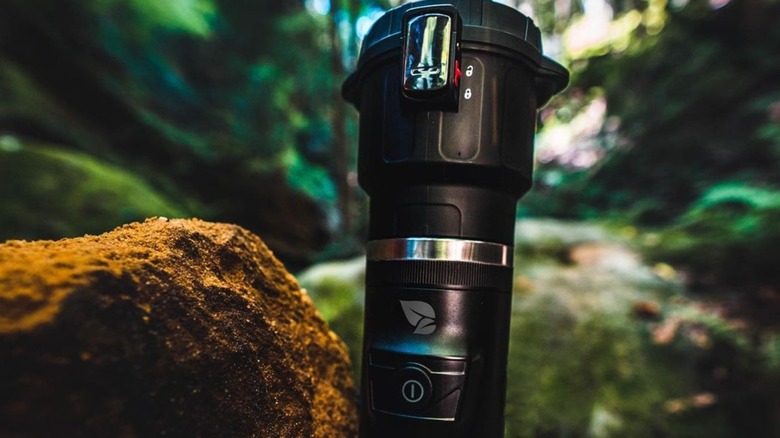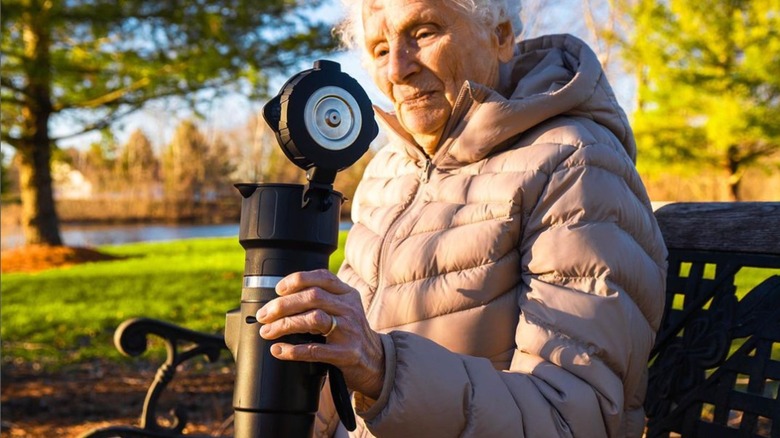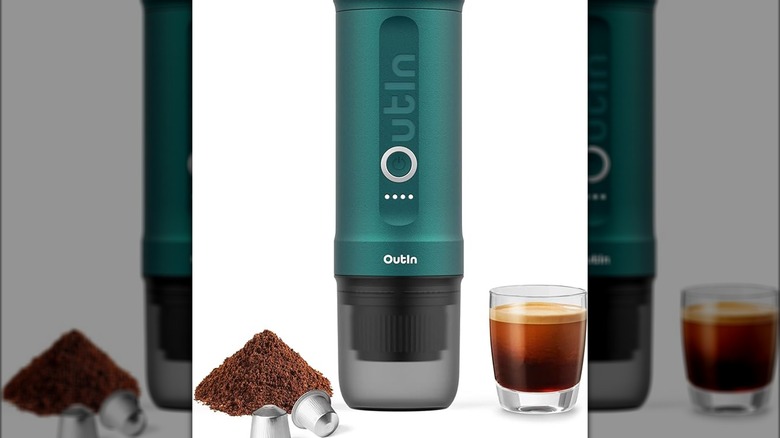Brümachen: Here's What Happened After Shark Tank
We may receive a commission on purchases made from links.
In 2021, Kweku Larbi and Ross Smith brought Brümachen to "Shark Tank, appearing on Season 12, Episode 11 of the hit show. Brümachen is a single-serve portable coffeemaker that uses standard-sized coffee pods like those for Keurig to brew the hot drink on-the-go. The invention is Larbi's brainchild, who offered a personal story as compelling as his creation. At the age of 17 and with $2,000 in his pocket, Larbi left his family in Ghana to move to the States alone and pursue a degree in civil engineering.
Eventually settling in Indiana, Larbi was inspired to create a portable coffeemaker while working construction on a remote job site during the winter. There, he witnessed the loss of productivity as workers were forced to leave the field for a cup of coffee. Using his engineering background, Larbi created an all-in-one solution that brewed the drink and doubled as a travel mug.
In 2020, Larbi partnered up with Smith, a social media influencer, to promote a Kickstarter campaign and generate demand for the product. With over 45 million followers across multiple platforms, Smith and his 94-year-old grandmother/co-star successfully created 100 million impressions in just a week, contributing to 470 backers and 600 units sold. Armed with utility patents pending for Brümachen and Larbi's additional invention, earth-friendly coffee pods that could replace plastic K-cups, he and Smith took the product to "Shark Tank," where they pitched Mark Cuban, Lori Greiner, Robert Herjavic, Kevin O'Leary, and guest Shark Daniel Lubetzky.
What happened to Brümachen on Shark Tank?
Retailing for $120 per unit, Brümachen produces 6 ounces of coffee within five minutes. The unit twists apart, exposing a water reservoir and a place to insert a K-cup (store-bought or founder Kweku Larbi's biodegradable version). Once screwed together, a simple push of a button heats water to 195 degrees Fahrenheit, brewing a hot cup of coffee. Although its tagline was, "A fresh brew. Anytime. Anywhere," in actuality, the portable coffeemaker runs on electricity, so an outlet, a car's 12-volt power source, or a USB port is required.
After demonstrating how the Brümachen worked, Larbi and Ross Smith asked the Sharks for a $1 million dollar investment in exchange for 10% equity. Although previous companies have entered the Tank asking for a similar amount, Brümacher's $10 million valuation quickly took the pitch from inspirational to unrealistic when the company's sales history was revealed.
The Sharks were shocked to learn that its sales were entirely based on the company's Kickstarter campaign, which garnered just $41,553. With paltry numbers, Kevin O'Leary asked, "Are you out of your mind?" questioning how they thought the company was worth $10 million. While Larbi remained silent, Smith defended the valuation, touting his social media influence, which O'Leary quickly shut down, declaring those facets weren't monetizable. One by one, the Sharks passed on the investment, and Larbi and Smith left without a deal.
Brümachen after Shark Tank
Although Kweku Larbi exited the Tank proclaiming the Sharks would regret their decisions, Brümachen didn't take off as anticipated. In fact, despite telling the panel that 600 Kickstarter units had been delivered, backer comments on the product's official website suggest otherwise. Many international investors said they had not received the product while U.S. investors reported receiving damaged units. In addition, there are repeated claims that all attempts to reach the company have been ignored, prompting some to threaten legal recourse.
In response, on January 7, 2021, Brümachen posted an update on the Kickstarter page, addressed to its "faithful backers" and signed by Larbi. The statement apologized for the delay and blamed unexpected shipping costs. The company further explained that it was out of money and was in the process of raising funds, forcing them to only ship units domestically, leaving international backers without the portable coffeemaker they were promised. Although an email address was provided for customers awaiting their Brümachen, comments as recent as February 2024 imply that the issue has not been rectified.
As a result, Brümachen is no longer in business. A dive into Larbi's LinkedIn account indicates that he ceased to be a part of the business after February 2021, which is shortly after he and Ross Smith appeared on "Shark Tank" in January of that year. Smith's LinkedIn account also omits all association with the business.
Why did Brümachen go out of business?
Brümachen isn't the only coffee startup to fail on "Shark Tank." Like other pitches, things looked promising for the company initially as the Sharks applauded the concept of the portable brewing machine and its inventor, Kweku Larbi. And the profit margins seemed favorable since the cost to manufacture the unit was $38 and it retailed for $120. Yet the momentum stalled after the episode aired. While it's unclear exactly why Brümachen failed, there appear to be several factors that contributed.
During the broadcast, each Shark delivered the same message to Larbi and Ross Smith, but perhaps Kevin O'Leary was the most direct, citing greed as the primary reason they failed. While Barbara Corcoran didn't appear in the episode, she weighed in via X, saying, "I love the idea, but I do have to agree with my fellow Sharks. A 10 million dollar valuation is way too high without concrete sales."
However, the valuation was a moot topic eventually, as the real demise for Brümachen may have been the multiple single-serve portable coffeemakers currently on the market. There's the Outin Nano Portable Electric Espresso Machine, founded in 2021; it's a rechargeable unit that retails for $149. At a lower price point, there's also WACACO Nanopresso Portable Espresso Maker, which retails for $85; unlike Brümachen's design that required a USB port or an electrical outlet to function, this appliance runs manually.
What's next for Brümachen's founders?
Since the demise of Brümachen, Kweku Larbi has continued innovating and is currently associated with two businesses. According to his LinkedIn page, Larbi founded The Green Board Organization in March 2018. The Indiana-based non-profit focuses on primary and secondary education in developing countries. Although Larbi's LinkedIn account states he is currently working with the organization, its website is not active.
Shortly after establishing The Green Board, Larbi and his wife, Sarah, founded the Baxter Wood Company, which manufactures apparel using post-consumer waste and eco-friendly materials. As stated on the official website, the Larbis said, "We started this because we love simple clothing and want to teach our child to live with less and love more." Baxter Wood currently sells men's and women's raincoats and jackets, with plans to expand into children's and leather goods. According to the website, Larbi also created the Baxter Wood Workshop to help fund his non-profit; the initiative repairs and upcycles donated clothing and auctions them off, donating 100% of the profits to The Green Board Organization.
Ross Smith is still pursuing a career as a social media influencer and is promoting several businesses, including Unrated, a cheeky T-shirt and hoodie retailer, and Rey Sumpremo tequila. His accounts prominently feature his grandmother, aka "Gangster Granny," who was referenced during the episode. The two create provocative posts which have amassed 3.1 million followers on Instagram and 11 million on Facebook.





